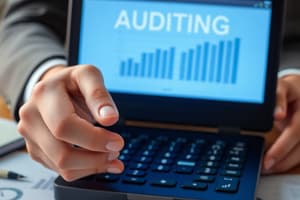Podcast
Questions and Answers
Which of the following actions is NOT a primary responsibility of an auditor under SA 240?
Which of the following actions is NOT a primary responsibility of an auditor under SA 240?
- Designing audit procedures in response to assessed fraud risks.
- Identifying potential fraud risks during the audit.
- Maintaining professional skepticism during the audit.
- Implementing company-wide fraud prevention measures. (correct)
What opinion is an auditor likely to issue if management refuses to rectify a significant misstatement resulting from fraud?
What opinion is an auditor likely to issue if management refuses to rectify a significant misstatement resulting from fraud?
- Unqualified Opinion.
- Qualified Opinion. (correct)
- Positive Opinion.
- Clean Opinion.
Which responsibility includes maintaining a critical mindset towards potentially misleading information during an audit?
Which responsibility includes maintaining a critical mindset towards potentially misleading information during an audit?
- Designing audit techniques.
- Evaluating evidence presented by management.
- Training junior auditors.
- Maintaining professional skepticism. (correct)
Which statement best describes the auditor's responsibility for fraud detection under SA 240?
Which statement best describes the auditor's responsibility for fraud detection under SA 240?
In circumstances of significant fraud, what is the auditor's ability to influence management's actions?
In circumstances of significant fraud, what is the auditor's ability to influence management's actions?
Flashcards are hidden until you start studying
Study Notes
SA 240 Auditor's Responsibilities Relating to Fraud
- Primary responsibility of a auditor: Identifying and assessing the risk of material misstatement due to fraud during an audit, and then responding to those risks by executing appropriate audit procedures.
- Auditors are not responsible for preventing fraud within an organization.
- Auditors maintain professional skepticism throughout the audit process.
Impact of Management Refusal to Correct Material Misstatement Due to Fraud
- If management refuses to correct a material misstatement due to fraud, the auditor should issue a qualified opinion.
- A qualified opinion indicates that the financial statements are presented fairly, except for the misstatement.
Studying That Suits You
Use AI to generate personalized quizzes and flashcards to suit your learning preferences.



